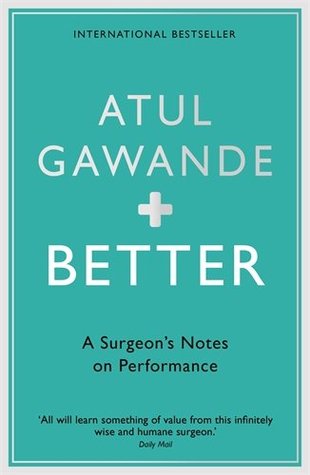Atul Gawande – Better
What does it take to be good at something in which failure is so easy, so effortless?
I bought this ebook some time ago and I should have read it sooner. Being someone who often doubts themselves and the path I’ve chosen – not for lacking love for medicine, but rather second guessing if I’m the right person for the job – I was quite familiar with many questions Atul Gawande raised.
In this book, he points out three points one could and should observe if one wants to do better.
DILIGENCE – DOING RIGHT – INGENUITY
Blurb The struggle to perform well is universal: each one of us faces fatigue, limited resources, and imperfect abilities in whatever we do. But nowhere is this drive to do better more important than in medicine, where lives are on the line with every decision. In his new book, Atul Gawande explores how doctors strive to close the gap between best intentions and best performance in the face of obstacles that sometimes seem insurmountable. Gawande’s gripping stories of diligence, ingenuity, and what it means to do right by people take us to battlefield surgical tents in Iraq, to labour and delivery rooms in Boston, to a polio outbreak in India, and to malpractice courtrooms around the country. He discusses the ethical dilemmas of doctors participation in lethal injections, examines the influence of money on modern medicine, and recounts the astoundingly contentious history of hand washing. And as in all his writing, Gawande gives us an inside look at his own life as a practising surgeon, offering a searingly honest firsthand account of work in a field where mistakes are both unavoidable and unthinkable. At once unflinching and compassionate, Better is an exhilarating journey narrated by arguably the best nonfiction doctor-writer around (Salon). Gawande’s investigation into medical professionals and how they progress from merely good to great provides rare insight into the elements of success, illuminating every area of human endeavour.
– via @goodreads
Opinion I’ve enjoyed the book quite a lot and read it in three days. It’s filled with stories about the three things that help us to do better. Two of them, the one about the polio vaccination efforts of the WHO and the one about the MRSA hygiene problem were particularly interesting to me. It reminded me of good hand hygiene and makes me take our hygiene experts even more seriously, which – if we’re being honest – most doctors don’t do.
But some doctors believe in homoeopathy, without knowing what it’s really all about – too. Of course, these stories are uplifting and devastating at the same time. It reminds you that medicine is a permanent struggle. It’s never done. Unless of course, we adjust our goals.
Adjusting your goals, away from perfection and to more effective and realistic ends can actually push us. This was shown in the story about war surgeons. And it reminded me for one about that great documentary Frontline Medicine with Michael Mosley – as well as something a palliative doctor once said:
If your goal is to defeat the illness, you’ll often lose – if you change your view and make it your goal to give your patient the best care possible, you often win.
By the best care, he meant taking reality and a persons wishes into account. You’ll probably lose the fight against death with a polydrug using patient who has a GI bleed and doesn’t want to live anymore. But if you take him and the situation into account you might just give him some dignity and a good death.
All in all the book was exhilarating and giving me strength, reminding me that not seeing everything rosy isn’t necessarily bad, but can actually make you a better person, because you strive for more.
Quotes
In medicine, our task is to cope with illness and to enable every human being to lead a life as long and free of frailty as science will allow. The steps are often uncertain. The knowledge to be mastered is both vast and incomplete.
As a doctor, you go into this work thinking it is all a matter of canny diagnosis, technical prowess, and some ability to empathize with people. But it is not, you soon find out. In medicine, as in any profession, we must grapple with systems, resources, circumstances, people—and our own shortcomings, as well.
The second challenge is to do right. Medicine is a fundamentally human profession.
Betterment is a perpetual labor. The world is chaotic, disorganized, and vexing, and medicine is nowhere spared that reality.
At times, in medicine, you feel you are inside a colossal and impossibly complex machine whose gears will turn for you only according to their own arbitrary rhythm. The notion that human caring, the effort to do better for people, might make a difference can seem hopelessly naïve. But it isn’t.
